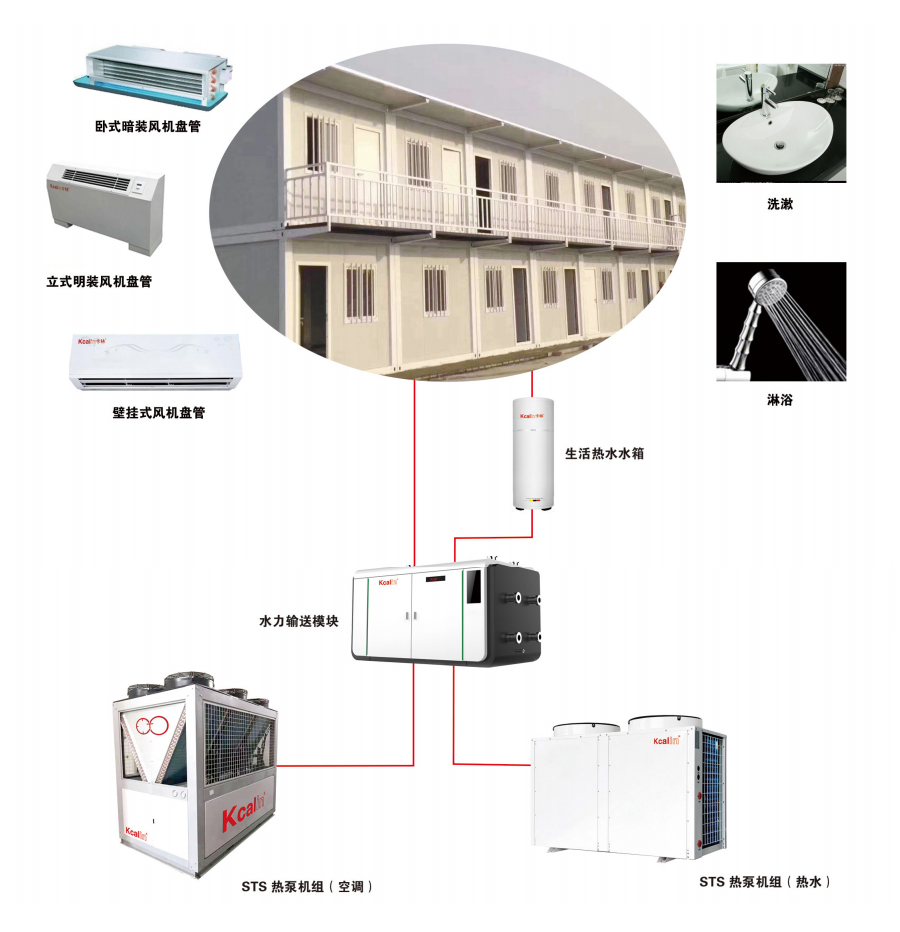A large amount of hot water is required in construction sites. However, traditional hot water supply methods often result in energy waste and environmental pollution. Therefore, more and more construction sites are adopting air powered hot water projects to improve energy efficiency and reduce environmental pollution.
Air energy hot water engineering is a technology that utilizes air energy to generate heat. It absorbs heat energy from outdoor air and converts it into hot water. Compared to traditional hot water supply methods, air energy hot water engineering has the following advantages:

Energy conservation: Traditional hot water supply methods often require a large amount of fuel or electricity consumption, while air energy hot water engineering can utilize natural energy, reduce dependence on fossil fuels, and thus reduce energy consumption and emissions.
Reducing environmental pollution: Traditional hot water supply methods generate a large amount of harmful substances such as carbon dioxide and nitrogen oxides, while air powered hot water projects do not produce harmful substances, making them more environmentally friendly.
Low maintenance cost: The maintenance cost of air energy hot water engineering is low because it does not require fuel or electricity, and only requires regular maintenance of the equipment itself.
Wide scope of application: Air powered hot water engineering is suitable for different construction sites, whether it is residential, commercial, or industrial buildings, all of which can use air powered hot water engineering.
In construction sites, the application of air energy hot water engineering can achieve the following points:
Ensuring the living needs of workers: Workers on construction sites need a large amount of hot water to meet their daily needs such as bathing and washing hands. The use of air powered hot water projects can provide them with sufficient hot water.
Improving production efficiency on construction sites: Some operations on construction sites require the use of hot water, such as concrete mixing. The use of air powered hot water engineering can ensure the supply of hot water and improve production efficiency.
Reducing energy waste and environmental pollution: Traditional hot water supply methods often cause energy waste and environmental pollution, while air energy hot water engineering can reduce the occurrence of these problems on construction sites. The implementation of air energy hot water engineering requires the following steps:
Design Plan: Based on the actual situation of the construction site, design a suitable air energy hot water engineering plan, including hot water demand, equipment capacity, equipment layout, etc.
Equipment installation: According to the design plan, select suitable equipment for installation, including air energy water heaters, water tanks, pipelines, etc.
System debugging: After completing the installation of the equipment, it is necessary to conduct system debugging, test the operation of the equipment and the hot water supply, and maintain the normal operation of the system.
Operation and maintenance: After the system operates normally, regular operation and maintenance are required to ensure the normal operation and long-term use of the equipment.
It should be noted that the implementation of air energy hot water engineering needs to pay attention to the following points:
Equipment selection: Different models and brands of air energy water heaters have different performance and efficiency, and suitable equipment needs to be selected based on actual needs.
Equipment installation: The installation of air energy water heaters requires professional personnel to follow installation specifications and operating procedures.
System debugging: System debugging requires careful testing of equipment operation and hot water supply to maintain normal system operation.
Operation and maintenance: Regularly maintain and clean the equipment to maintain its normal operation and long-term use.
Overall, air energy hot water engineering is an environmentally friendly and energy-saving hot water supply method. Its application in construction sites can improve the quality of life of workers, improve production efficiency of construction sites, and reduce energy waste and environmental pollution. Attention should be paid to the selection, installation, and maintenance of equipment to maintain the normal operation and long-term use of the system.







Comment